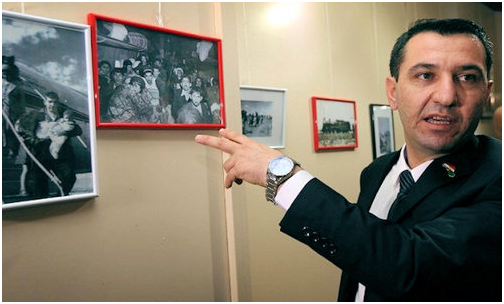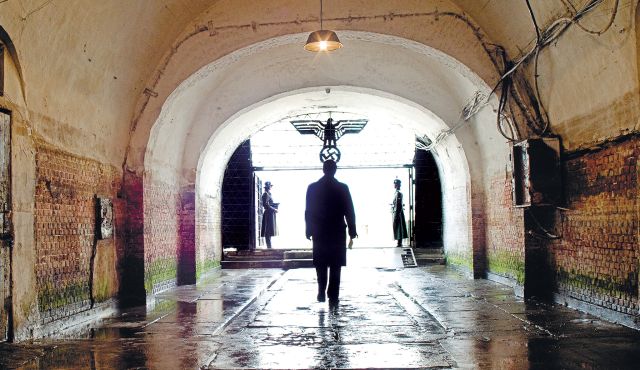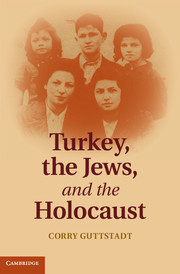Commemorating the 1951 Jewish Expulsion from Iraq
Yesterday in Erbil, the Kurdistan Regional Government commemorated the expulsion of 25,000 Jewish Kurds by the Iraqi National government in April 1951. They were among an estimated 125,000 Iraqi Jews who walked or flew on the Biblical wings of eagles in a massive airlift to Israel in Operation Ezra and Nehemiah. Their properties, assets, funds were expropriated by the Iraqi government that some estimate were worth several billion in current dollars of account.

Sherzad Omar Mamsani, Jewish Representative at Kurdistan Regional Religious Affairs Ministry.
The largest contingent were the Baghdadi or Babylonian Jews, while Kurdish Jews were the smallest contingent of the mass expulsion after having resided more than 2,700 years in both the Assyrian and Babylonian captivities. The Babylonian Jews produced the great rabbinic commentaries in the Talmud and other works that are studied daily in Yeshivas in Israel and the Jewish Diaspora.
Iraqi Jewish emigrants to Israel and the West have made major contributions to the establishment and growth of the modern State of Israel. While initially opposed to Zionism, following The Farhud, the Arab Nazi-inspired pogrom in June 1941, and especially, after the invasion by Iraq of the embryonic State of Israel in the 1948 1949 War of Independence and issuance of expropriations and expulsion orders, Iraq’s Jews realized that Israel was the only sanctuary and made arrangements to leave en mass. We have written of that in our NER interviews with Dr. Harold Rhode, whom we dubbed “the savior “of the Babylonian Jewish archives.
During the preparation for our NER interview with US Army Brig. Gen. (ret.) Ernie Audino published in the December 2015 NER, he recommended reading a remarkable memoir of one Kurdish Jewish family from Zakho in Kurdistan near the Turkish border, My Father’s Paradise: A Son’s Search for his Father’s Past by Ariel Sabar. Saber’s book discusses his family’s integration in Israel. Noteworthy is the chronicle of Saber’s father who earned degrees at both Hebrew and Yale Universities becoming a full professor at UCLA and world recognized expert in the lingua franca spoken by Kurdish Jews, neo-Aramaic.
While heretofore little was known about the Kurdish Jews who arrived in Israel in 1951, more became known as the descendants of this wave of enforced emigration after arriving in Israel. It is estimated that Israel has more than 200,000 citizens of Kurdish Jewish origins, with 100,000 living in greater Jerusalem, alone.
Yesterday’s commemoration in Erbil was reported by AFP/ Arutz Israel National News and the RUDAW Kurdish news agency. The AFP/ Arutz Sheva National News article ,”Jewish Kurds hold groundbreaking Iraq commemoration:”
In the Kurdish autonomous, region in northern Iraq, a ceremony was held on Monday to mark the deportation of Jews from Iraq seven decades ago, AFP reports.
The event also marked the beginning of Jewish representation at Kurdistan region’s Religious Affairs Ministry, which is the result of a law passed in May to promote minority rights. “The law says that if there was one person from the followers of any religion, his rights are preserved,” said Sherzad Omar Mamsani, the Jewish representative at the Kurdish Regional Ministry.
The ceremony in the regional capital Erbil was attended by Kurds of Jewish origin and officials who also visited an exhibition of old photographs and records documenting Iraqi Jewry.
According to Mamsani, the ceremony is the first of its kind and marks what is known as theFarhud, the dispossession that led to the exodus and deportation of Jews from Iraq.
Mamsani, who has Jewish origins, said he estimated that the families who self-identify as Jews in Kurdistan but are still officially registered to as Muslims numbered around 400. He added that the number of families who converted to Islam but “are Jews in origin” was in the thousands.
Zach Huff, an American researcher living in Israel and specializing in Kurdish affairs, said he hoped Monday’s ceremony was the start of a Jewish revival in the Iraqi region of Kurdistan. “There are about 200,000 Kurds living in Israel and close to 100,000 living in and around Jerusalem,” he toldAFP.
“They do actually long to connect with their roots in Kurdistan even if they’re second or third generation,” Huff said. “They see that Kurdistan is open and welcoming them with open arms.”
“I do predict that there will be a lot more business, tourism and a closer relationship in the near future between Jewish Kurds and the people of Kurdistan,” Huff said.
There is no active synagogue in the region but Mamsani has said he hoped that would change soon.
Watch this RUDAW news video of the Kurdistan commemoration, “Kurdistan celebrates Kurdish Jews.
The following is an excerpt from Saber’s My Father’s Paradise pp. 104-105 describing the family’s experience on the day of expulsion, April 16, 1951 for Iraq’s Jews:
The end arrived suddenly. A line of motor coaches rolled into town early one April [1951] morning, and word went out that the time had come. Under a sky still full of stars , Jewish families , anxious and bleary, dragged suitcases and children out front doors and into the cramped alleys that led to the main street. As they crossed the bridge to the bus stop, they saw that another crowd had gotten there first: Hundreds of Muslims had lined the streets to bid their neighbors farewell. Old women raised cries of li-li-li-li-li, ululating as if a loved one had died. One beggar –beloved of the townspeople, though he was slightly mad- pounded his head had against a newly erected electric pole. “Where are my brothers going!” he shrieked, until people crowded in to console him. “Why are they forsaking us?” Buses carried the [Zakho’s]Jews to Mosul, and trains carried them to Baghdad. At the airport, angry mobs pressed against the barricades hurling curses. “Die kilab yahud!” “Rot in Hell” “Be gone!” It was April 16, 1951. Miryam flinched at the ugly words and pulled her children against her skirt as crowds of departing Jews pressed in from all sides. A few hours later, the Bah Saba has reached the checkpoint where guards searched bodies and luggage for contraband”.
EDITORS NOTE: This column originally appeared in the New English Review.




